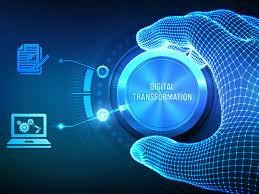From Legacy to Leading-Edge: The Digital Transformation Journey

In an era driven by technological advancements, businesses must evolve or risk obsolescence. Digital transformation is not just a buzzword but a necessity for organizations looking to maintain a competitive edge. The shift from legacy systems to modern, agile solutions allows businesses to enhance efficiency, improve customer experiences, and unlock new growth opportunities. This blog explores the digital transformation journey, outlining its key stages, challenges, and the rewards it offers.
Understanding Digital Transformation
Digital transformation refers to the integration of digital technologies into all aspects of a business, fundamentally changing how organizations operate and deliver value to customers. It is not merely about upgrading IT infrastructure but involves a cultural shift that requires businesses to continuously challenge the status quo, experiment, and embrace change.
The Key Stages of Digital Transformation
-
Assessment and Strategy Development
The first step in the digital transformation journey is evaluating the current state of an organization’s technology and business processes. This phase involves identifying inefficiencies, understanding customer pain points, and setting clear digital transformation objectives. -
Technology Adoption and Integration
Once a strategy is in place, businesses must adopt and integrate new technologies. This could involve cloud computing, artificial intelligence, automation, or data analytics. The focus should be on selecting solutions that align with the company’s goals and enhance its operational capabilities. -
Cultural and Organizational Change
Technology alone does not drive transformation; people do. Employees must be trained and encouraged to embrace new tools and methodologies. Organizations should foster a culture of innovation and adaptability, ensuring that employees are aligned with the company’s digital vision. -
Implementation and Optimization
Deploying new digital tools is just the beginning. Businesses must continuously monitor performance, optimize processes, and refine strategies based on real-time data and feedback. This iterative approach ensures that digital transformation remains dynamic and responsive to changing market conditions.
Challenges in Digital Transformation
Despite its benefits, digital transformation comes with its share of challenges. Some of the most common obstacles include:
-
Resistance to Change – Employees accustomed to traditional processes may resist digital initiatives.
-
High Costs and ROI Concerns – Implementing new technologies can be expensive, making it crucial to ensure a positive return on investment.
-
Cybersecurity Risks – With increased digitalization comes the need for robust cybersecurity measures to protect sensitive data.
-
Integration Issues – Legacy systems may not seamlessly integrate with modern digital solutions, leading to implementation delays and inefficiencies.
The Rewards of Digital Transformation
Organizations that successfully navigate the digital transformation journey reap numerous benefits, including:
-
Enhanced Efficiency – Automation and AI-driven solutions reduce manual workloads, increasing productivity.
-
Improved Customer Experience – Personalized and seamless digital interactions enhance customer satisfaction and loyalty.
-
Greater Agility – Businesses can quickly adapt to market changes, gaining a competitive advantage.
-
Data-Driven Decision Making – Advanced analytics provide insights that help optimize strategies and operations.
Conclusion
Digital transformation is not a one-time project but a continuous journey. Businesses that embrace this evolution will remain resilient and competitive in an increasingly digital world. While challenges exist, the long-term benefits far outweigh the initial hurdles. By strategically integrating technology, fostering an innovative culture, and continuously refining processes, organizations can successfully transition from legacy systems to leading-edge solutions, ensuring sustainable growth and success in the digital age.






